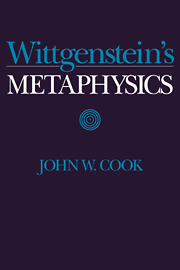Book contents
- Frontmatter
- Contents
- Preface
- List of Abbreviations
- Introduction
- Part I From Idealism to Pure Realism
- 1 Wittgenstein's Philosophical Beginnings
- 2 Neutral Monism
- 3 The ‘Objects’ of the Tractatus
- 4 The Essence of the World Can Be Shown But Not Said
- 5 What the Solipsist Means is Quite Correct
- 6 Pure Realism and The Elimination of Private Objects
- Part II The Metaphysics of Wittgenstein's Later Philosophy
- Part III Causation and Science in a Phenomenal World
- Part IV Logical Possibilities and the Possibility of Knowledge
- Part V The Past, Memory, and The Private Language Argument
- Name Index
- Subject Index
6 - Pure Realism and The Elimination of Private Objects
Published online by Cambridge University Press: 05 November 2011
- Frontmatter
- Contents
- Preface
- List of Abbreviations
- Introduction
- Part I From Idealism to Pure Realism
- 1 Wittgenstein's Philosophical Beginnings
- 2 Neutral Monism
- 3 The ‘Objects’ of the Tractatus
- 4 The Essence of the World Can Be Shown But Not Said
- 5 What the Solipsist Means is Quite Correct
- 6 Pure Realism and The Elimination of Private Objects
- Part II The Metaphysics of Wittgenstein's Later Philosophy
- Part III Causation and Science in a Phenomenal World
- Part IV Logical Possibilities and the Possibility of Knowledge
- Part V The Past, Memory, and The Private Language Argument
- Name Index
- Subject Index
Summary
In Chapter 2 we saw that a principal tenet of neutral monism is its rejection of the dualist's idea that there are “inner” and “outer” worlds. In consequence, it refuses to allow that anything is subjective or private. As W. T. Stace points out, “In a pure neutral monism there should, of course, be nothing which is purely subjective.” This element of neutral monism was evident in the writings of the American realists as early as 1912, when R. B. Perry wrote:
Most philosophers assume that it is essentially characteristic of a mind to be accessible only to itself. This proposition is rarely supported by evidence; it is commonly held to be sufficient to call attention to it. … As [one] writer expresses it, “That the mind of each human being forms a region inaccessible to all save its possessor, is one of the commonplaces of reflection.”
… I believe this presupposition … to be the greatest present obstacle to the clear and conclusive definition of mind. …
Perry goes on to argue that “the notion of the privacy of mental contents” is the product of fallacious reasoning.
In this chapter we will consider how Wittgenstein came to adopt and defend this aspect of neutral monism.
Formulating the Problem
Wittgenstein's way of understanding the problem was shaped by an objection to neutral monism that Russell had raised in his 1914 essay “On the Nature of Acquaintance.”
- Type
- Chapter
- Information
- Wittgenstein's Metaphysics , pp. 69 - 82Publisher: Cambridge University PressPrint publication year: 1994



